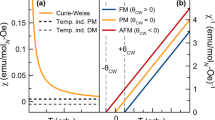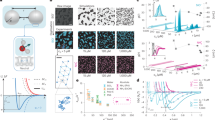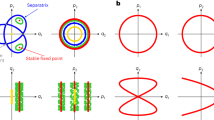Abstract
IT is typical for nuclear reactions initiated by collisions or radiation that they may, to a large extent, be considered as taking place in two steps: the formation of a highly excited compound system and its subsequent disintegration or radiative transition to a less excited state. We denote by A, B, . . the possible alternative products of the reaction, specified by the nature, internal quantum state, and spin direction both of the emitted particle or photon and of the residual nucleus and the orbital momentum. Further, we call PA, PB . . . the probabilities, per unit time, of transitions to A, B, . . . respectively, from the compound state.
This is a preview of subscription content, access via your institution
Access options
Subscribe to this journal
Receive 51 print issues and online access
$199.00 per year
only $3.90 per issue
Buy this article
- Purchase on Springer Link
- Instant access to full article PDF
Prices may be subject to local taxes which are calculated during checkout
Similar content being viewed by others
References
The details of this and of the other arguments of this note will be published in the Proceedings of the Copenhagen Academy.
Bothe, W., and Gentner, W., Z. Phys., 106, 230 (1937); 112, 45 (1939).
Author information
Authors and Affiliations
Rights and permissions
About this article
Cite this article
BOHR, N., PEIERLS, R. & PLACZEK, G. Nuclear Reactions in the Continuous Energy Region. Nature 144, 200–201 (1939). https://doi.org/10.1038/144200a0
Issue Date:
DOI: https://doi.org/10.1038/144200a0
This article is cited by
-
Critique of the “Clark Effect”
Nature (1967)
-
Sezione d'urto totale di alcuni elementi per neutroni di 14 MeV
Il Nuovo Cimento (1953)
-
Sullo sparpagliamento elastico dei neutroni veloci da parte di nuclei medi e pesanti
Il Nuovo Cimento (1946)
Comments
By submitting a comment you agree to abide by our Terms and Community Guidelines. If you find something abusive or that does not comply with our terms or guidelines please flag it as inappropriate.



